 The trial of El Chapo Guzman is as disappointing to criminologists trying to understand the deep structure of the drug trade as a rained-out series between The Yankees and Red Sox is to baseball fans waiting to place bets on who’s going to win the American League.
The trial of El Chapo Guzman is as disappointing to criminologists trying to understand the deep structure of the drug trade as a rained-out series between The Yankees and Red Sox is to baseball fans waiting to place bets on who’s going to win the American League.
This week in El Chapo’s trial was like watching an alternative reality TV show, like the one about what if the Nazis had won World War II. Federal prosecutors pretended that we live in a world where neither the NSA nor the company once housed in the building below, which sits on a headquarters campus in Clearwater-St. Pete Florida, ever existed.
The deliberate omissions by prosecutors exposed what they attempted to conceal: a global drug cartel composed of governments and gangsters.
Nothing to see here. Move along.
 From a secrecy-obsessed proceeding filled with whispered sidebars between attorneys and a Judge determined that the less the public knows the better, the trial in recent days devolved even further. Instead of a courtroom in Brooklyn, observers might have felt they’d been transported to a science fiction and comic book convention like Comic-Con.
From a secrecy-obsessed proceeding filled with whispered sidebars between attorneys and a Judge determined that the less the public knows the better, the trial in recent days devolved even further. Instead of a courtroom in Brooklyn, observers might have felt they’d been transported to a science fiction and comic book convention like Comic-Con.
Prosecutors presented a story line straight out of a celebrity news and gossip talkfest like Entertainment Tonight or Page 6 TV.
A man on trial for allegedly being the market leader in a $500 billion dollar a year industry in the U.S. alone was forced to “suck it up,” in the New York Post’s felicitous phrase, while prosecutors revealed hundreds of text messages he sent—not to fellow titans of cocaine, or government and law enforcement officials— but to his wife and mistresses.
The horror. The horror.
New revelations
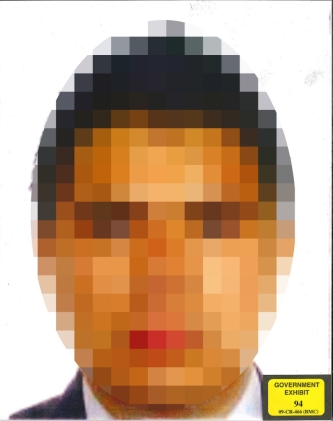 Two things were learned in the trial this week: The first is that El Chapo has “a sing-songy voice on tape with a kind of nasally undertone.”
Two things were learned in the trial this week: The first is that El Chapo has “a sing-songy voice on tape with a kind of nasally undertone.”
The other revelation was more important: Justice Department officials have no compunction about lying — because it’s a matter of “national security”— about anything to do with the U.S. government’s relation to the drug trade.
The story federal prosecutors presented was “The secret to bringing down notorious Mexican cartel kingpins? Just ‘get to’ his IT guy.” The evidence showed that the FBI had successfully flipped the Sinaloa Cartel’s tech guru to decode the cartel’s encrypted computer system.
Was this just the FBI’s oblique way of telling the world that the NSA has long been stonewalling federal law enforcement?
So far there is no indication that this is the case.
Alternative history that makes sense
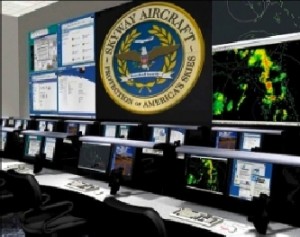 Here is an alternative version of reality that better fits the facts:
Here is an alternative version of reality that better fits the facts:
In 2003 a St. Petersburg, FL company called SkyWay Global LLC moved into new headquarters in an 80,000 square foot building owned by an Israeli tele-communications company called ECI Telecom. After the dodgy fashion of infamous Blackwater Security, ECI Telecom has changed its name repeatedly, and became best-known as Verint Systems Inc.
An 80,000 square foot building on a seven acre campus might seem a little extravagant for a firm like SkyWay, which had no product, no sales, and no prospects. In fact, SkyWay’s only overt act of capitalism turned out to be the purchase and ownership of several DC-9’s.
But the company had powerful sponsors in Washington D.C. And SkyWay also had another ace in the hole: ownership of two DC-9’s, one of which was found carrying 5.5 tons of cocaine on April 10, 2006 in Ciudad del Carmen in Mexico’s state of Campeche.
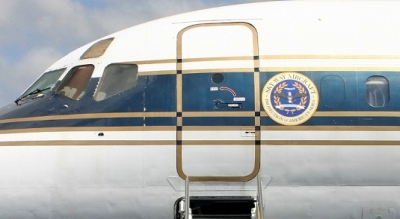 The cocaine discovered on SkyWay’s DC-9 belonged to El Chapo’s Sinaloa cartel.
The cocaine discovered on SkyWay’s DC-9 belonged to El Chapo’s Sinaloa cartel.
The story of how this actually happened is long and involved, and can be better understood in this archive of reporting.
SkyWay Global’s twisted and ignominious three-year long skein of lies and financial fraud ended in bankruptcy. That was expected. What wasn’t foreseen was SkyWay’s ownership of the DC-9 caught carrying 5.5 tons of cocaine belonging to the Sinaloa Cartel.
Information you’ve been cleared for
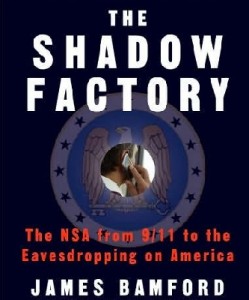 Othere than who owned the cocaine, what does this alternative version of reality have to do with the trial of El Chapo Guzman?
Othere than who owned the cocaine, what does this alternative version of reality have to do with the trial of El Chapo Guzman?
First, the company which owned SkyWay’s headquarters building, Verint Systems, had a contract with the NSA to wiretap U.S. phones through the communication lines of Verizon, which handles almost half of all U.S. landline and cell phone calls.
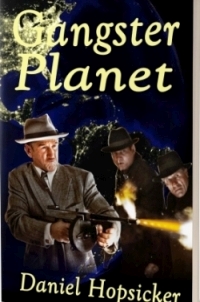
This was first revealed in a book in 2008 about the NSA called “The Shadow Factory, The Ultra-Secret NSA from 9/11 to the Eavesdropping on America,” where author James Bamford disclosed disturbing facts about America’s two major telecom companies, AT & T and Verizon, which had outsourced the “bugging” of their entire networks to “two mysterious companies with very troubling foreign connections.”
Verint is one of those two “mysterious companies.”
And in 2006 the Bush Administration chose Verint—SkyWay’s landlord, or partner, or co-conspirator— to install a telephone and Internet wiretapping center in Mexico which allowed authorities there to eavesdrop on every landline and cell phone call made in the country.
Once more, with feeling
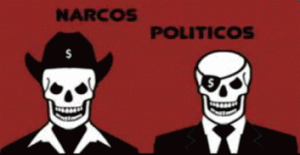 The news is so startling that it’s worth repeating: SkyWay’s headquarters was owned by the same Israeli-owned tele-communications firm which the Bush Administration picked to install automatic phone tapping equipment in Mexico.
The news is so startling that it’s worth repeating: SkyWay’s headquarters was owned by the same Israeli-owned tele-communications firm which the Bush Administration picked to install automatic phone tapping equipment in Mexico.
The Verint deal leveraged U.S. influence over corrupt Mexican politicians. It allowed authorities there to eavesdrop on every landline or cell phone call made by drug traffickers or organized crime. It favored one group of cut-throat killers over all the others. This was probably seen as being neither here nor there.
In Guatemala, the company, in its Tadiran iteration, funded an electronics school for the Guatemalan army, and became infamous for installing computers used to select death squad victims, as well as pinpoint urban guerrilla safe houses.
 Israel was at that same time setting up factories to manufacture ammunition and replacement parts for Guatemala’s Israeli-made rifles, and advising the Guatemalan military by providing military, counterinsurgency, and intelligence advisers for what human rights groups called a genocidal war which included forced resettlement schemes in the rural highlands against a largely Mayan Indian population.
Israel was at that same time setting up factories to manufacture ammunition and replacement parts for Guatemala’s Israeli-made rifles, and advising the Guatemalan military by providing military, counterinsurgency, and intelligence advisers for what human rights groups called a genocidal war which included forced resettlement schemes in the rural highlands against a largely Mayan Indian population.
By way of deception
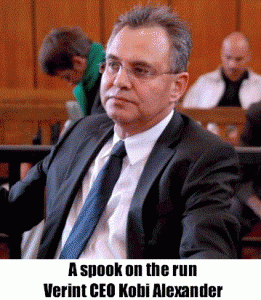 Verint’s founder and CEO was a man named Jacob “Kobi” Alexander, a former Israeli intelligence officer. Alexander became infamous for a decade for hiding out in Namibia as a fugitive from justice, where he fought extradition to the U.S., no doubt with the silent encouragement of almost everyone in Washington D.C.
Verint’s founder and CEO was a man named Jacob “Kobi” Alexander, a former Israeli intelligence officer. Alexander became infamous for a decade for hiding out in Namibia as a fugitive from justice, where he fought extradition to the U.S., no doubt with the silent encouragement of almost everyone in Washington D.C.
Also on Verint’s Board of Directors was Lieutenant General Kenneth A. Minihan, former director of the NSA. This led conspiracy theorists—you know who you are—to speculate the company was a joint NSA-Mossad operation.
James Bamford reported “When Comverse Infosys [now Verint] founder and CEO Jacob ‘Kobi’ Alexander fled to Israel and later Namibia in 2006, the former Israeli intelligence officer and entrepreneur took along a little extra cash for his extended ‘vacation’–$57 million to be precise.”
Alexander was a veteran of Israel’s ultra-secretive Unit 8200, the equivalent of America’s National Security Agency. He fled to Namibia while facing a 32-count indictment by the Justice Department over allegations he masterminded a scheme to backdate millions of stock options which allowed the enterprising corporate grifter to embezzle some $138 million from company shareholders.
After a decade on the run, he returned to the U.S. and was sentenced in February of 2017 to 30 months in prison. A year later he was transferred to Israel to carry out his remaining sentence, and was released in October of 2018.
“In other related news…”
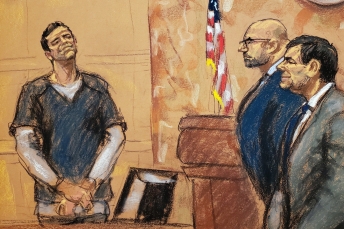
Vincente Zambada-Niebla, the star witness so far in the trial of El Chapo Guzman, had boldly claimed to have carte blanche from the U.S. Government to smuggled drugs into the U.S. almost immediately after his arrest. He threatened to expose the DEA’s secret deal with the Sinaloa Cartel.
Court filings in the case of Vicente Zambada Niebla demonstrated the insidious nature of the cooperation between the US government and Mexico’s Sinaloa Cartel.
Then, raising eyebrows and suspicions still further—as if that were even possible— prosecutors in Chicago belatedly announced almost a year after the fact that Zambada had secretly pled guilty to conspiring to smuggle and distribute tons of cocaine and heroin into the United States.
In court proceedings before the announcement of his plea, U.S. prosecutors frequently invoked “national security” to ensure sensitive and embarrassing evidence was not made available to Zambada’s attorneys.
In the end Zambada took a deal, pled guilty, and began learning his lines to testify against El Chapo.
A little bit of backstory
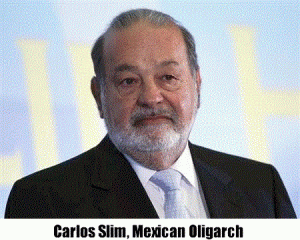 In 1990, Mexico’s only mobile phone provider Telefonos de Mexico (Telmex) was bought by a group of investors led by Carlos Slim Helú, Mexico’s richest man,who famously later bought a stake in the New York Times.
In 1990, Mexico’s only mobile phone provider Telefonos de Mexico (Telmex) was bought by a group of investors led by Carlos Slim Helú, Mexico’s richest man,who famously later bought a stake in the New York Times.
Then in 2003 —Verint, then called Comverse; as has been seen the company changed its name more often than Madonna changed boyfriends— was chosen by Telmex, as stated in their press release, to “Implement a Widespread Expansion of Voicemail Services.”
As already shown, “In 2006 the Bush Administration entered into a quiet agreement with the Mexican Government to fund and build an enormous $3 million telephone and Internet eavesdropping vendor that would reach into every town and village in the country,” reported James Bamford.
In fact, the 2003 press release from Carlos Slim’s Telmex suggests the program in Mexico probably began three years earlier.
“The purpose is to create swift investigative measures against organized crime,” said Mexican president Felipe Calderon at the time the deal was announced.
Reported Sam Enriquez in the Los Angeles Times in May of 2007
“Although the proposal stems from the president’s noble intention of efficiently fighting organized crime, the remedy seems worse than the problem.”
“The system the Bush Administration chose for Mexico is similar to the warrant-less eavesdropping operation in the U.S., and used the same vendor, the Israeli company Verint, founded by veterans of that country’s NSA, the hyper-secret Unit 9200.”
“Paid for by the U.S. State Department, it was installed by a politically well-connected firm based in Melville, N.Y., that specializes in electronic surveillance.”
The New York Times, drug money, and Carlos Slim
 Mexico’s richest oligarch Carlos Slim Helú’s links to the drug trade have been the subject of rumors for years. One reason why: When Amado Carrillo Fuentes, known in Mexico as “Lord of the Skies” for his vast armada of planes, died in 1997 while undergoing plastic surgery, according to the AP he was worth $25 billion.
Mexico’s richest oligarch Carlos Slim Helú’s links to the drug trade have been the subject of rumors for years. One reason why: When Amado Carrillo Fuentes, known in Mexico as “Lord of the Skies” for his vast armada of planes, died in 1997 while undergoing plastic surgery, according to the AP he was worth $25 billion.
Drug Lord Amado Fuentes had managed to salt away $10 billion a decade in the drug trade, where counting your money can be a bigger problem than making it.
In the tear 2000 Carlos Slim, according to numerous published reports, was worth $6 billion. For example, Mexico City newspaper La Jornada on May 7, 1999 fixed Slim’s fortune at “something like $6 billion.”
Latin Trade magazine pegged Slim as being worth $7.2 billion. In other words, after working hard for more than 40 years, Carlos Slim was worth a hefty sum.
Yet, according to news reports in 2009, when Slim made his big investment in the New York Times, he was now worth between $57 billion and $60 billion dollars.
Has anyone in history ever made $50 billion in just ten years? Did Carlos Slim? Not by doing anything legal. Do the math. Mexico’s richest man is dirty.
The definition of ‘making a start’
 I first learned of the NSA’s involvement in drug trafficking in 2000, more than a decade before the super-secret NSA became a household name.
I first learned of the NSA’s involvement in drug trafficking in 2000, more than a decade before the super-secret NSA became a household name.
The source for that story was Russ Eakin, whose name can be revealed since he’s dead. Eakin told me he had been the NSA’s “man on the ground” in Bolivia during the Cocaine Coup in the early 1980’s.
He was also a longtime friend and associate of Barry Seal, the subject of my book “Barry & the boys.”
Other previously-undisclosed ties between SkyWay and the NSA are in the court documents of two men implicated in this same drug trafficking network were convicted. Douglas McClain Jr, was sentenced to 14 years for money laundering in Federal Court in San Diego. McClain had been president of Argyll Equities, a private bank in Texas which purchased the drug-running DC-9 for SkyWay.
Joining McClain in the Big House was Jonathon Curshen, who got twenty years for fraud and money laundering.
“Just some guy in Costa Rica”
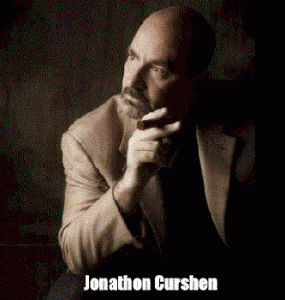 Curshen, an American con man from Sarasota Florida, controlled a company in Costa Rica called Red Sea Management, provided the ‘fig leaf’ rationale — in return for 28,000,000 shares of common stock in SkyWay—for SkyWay’s purchase of a 1966 McDonald Douglas DC-9 that shortly thereafter began carrying cargo which came to include 5.6 tons of cocaine worth several hundred million dollars.
Curshen, an American con man from Sarasota Florida, controlled a company in Costa Rica called Red Sea Management, provided the ‘fig leaf’ rationale — in return for 28,000,000 shares of common stock in SkyWay—for SkyWay’s purchase of a 1966 McDonald Douglas DC-9 that shortly thereafter began carrying cargo which came to include 5.6 tons of cocaine worth several hundred million dollars.
SkyWay had put out a press release announcing the deal: “The DuPont Investment Fund 57289, Inc. Satisfies $7 Million Funding Agreement with SkyWay Communications Holding Corp.”
“They wrote it up in a press release, touting how they’d just received a big investment from the DuPont Foundation,” explained a former SkyWay executive.
“It turned out to be bogus. It was just some guy (Curshen) at a desk in Costa Rica.”
But what is known about SkyWay may also illustrate just how much we still don’t know about the NSA.
Unintended consequences
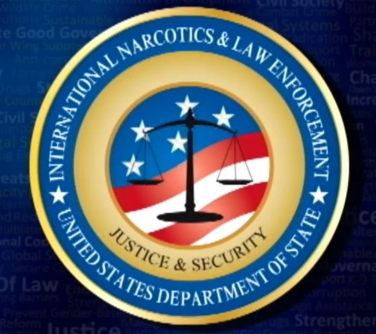 In Mexico Verint’s software was used by law enforcement agencies like Mexico’s Secretaría de Seguridad Pública (SSP) and the Agencia Federal de Investigación (AFI), whose names also change as frequently as Blackwater’s.
In Mexico Verint’s software was used by law enforcement agencies like Mexico’s Secretaría de Seguridad Pública (SSP) and the Agencia Federal de Investigación (AFI), whose names also change as frequently as Blackwater’s.
There is no question that the result was to grant the Sinaloa Cartel “most favored nation’ status over the competing Gulf, Juárez, Knights Templar, and Los Zetas cartels.
“It is a government of Mexico operation funded by the U.S.,” said Susan Pittman, of the State Department’s Bureau of International Narcotics and Law Enforcement Affairs. Queries should be directed to the Mexican government, she said.
At the time the deal was said to underscore the close relationship between Mexico’s conservative President Felix Calderon and Republican U.S. President George W. Bush.
A classy ending quote
 “The history of the great events of this world is the history of crime,” wrote Voltaire.
“The history of the great events of this world is the history of crime,” wrote Voltaire.
Unraveling the mystery of these connections ‘might could’— as they say in the South where most of the story occurs—give a better picture of the deep structure of the global drug trade than the trial of El Chapo Guzman.
Almost twenty years ago, I asked a simple question which remains unanswered, and put it on the back cover of a documentary titled “The Secret Heartbeat of America.”
“How do you hide a $300 billion a year industry (its now $500 billion) from a government that can read the make of your golf ball from outer space?”
To date the question has not been answered.


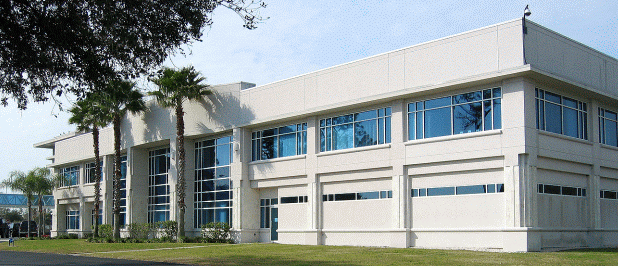

[…] http://www.madcowprod.com/2019/01/13/the-trial-of-el-chapo-guzman/ […]
Mar 6, 2017 Drug Boss Escobar Worked for the CIA
The notorious cocaine kingpin Pablo Escobar worked closely with the CIA, according to his son. In this episode of The Geopolitical Report, we look at the long history of CIA involvement in the international narcotics trade, beginning with its collaboration with the French Mafia to using drug money to illegally fund the Contras and overthrow the Sandinista government in Nicaragua. We also look at how drug profits are used to float Wall Street and the role big banks play in laundering huge amounts of illicit drug profits.
https://youtu.be/3bUN9azbYX8